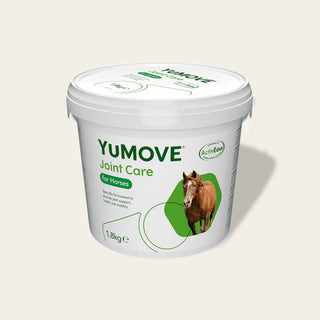

Stiff horses and cold weather
Deep snow, joint-chilling winds and generally cold temperatures are all difficult for us to deal with. And it’s not easy for your horse either – especially if they already have stiff joints or mobility issues. But why does the cold weather affect your horse’s joints? And what steps can you take to soothe the stiffness this winter?
The signs of joint stiffness in horses
You might think that healthy joints in horses are a given. After all, horses are strong, active and adaptable creatures. But unfortunately, when a horse has stiff joints, their joints, cartilage and tissues are all slowly deteriorating. And it can sometimes be hard to spot the signs from the outside. Here are just a few signs of stiffness to keep an eye out for:
- Decreased activity or mobility
- A reduced range of motion in the joint
- Warmth around the affected area
- Swelling
- A change in your horse’s body language
- Pain or limping
- Lameness
Why the cold weather affects your horse’s joints
Scientists aren’t completely certain why joints become stiffer and more achy when it’s cold. In fact, the same thing happens in humans, and our doctors haven’t determined the cause either. But changes in air pressure, a lack of exercise and taking longer to warm up are just a few of the most likely reasons why your horse feels more joint discomfort when it’s chilly outside.
- Standing still. Icy temperatures result in less exercise, a lack of turnout time and idleness. But horses with stiff joints need to move as much as possible to keep their joints lubricated and muscles strong.
- Rigid muscles. The cold can cause muscles to become tense and stiff. That’s because it (literally) freezes them up. Sarcopenia – or muscle wasting – is common in older horses, and can get much worse if they’re not properly exercised.
- A drop in barometric pressure. This can cause your horse’s tendons, muscles and surrounding tissues to expand. And because there’s only so much room in your horse’s body, it results in discomfort and inactivity.
Exercising your horse when it’s cold
When it comes to the health of your horse’s joints, the most important thing is regular exercise. Although your equine companion might not want to keep moving in the cold (and initially they might feel very stiff), daily exercise strengthens the body and gives their joints a boost.
Turnout isn’t enough when it’s cold outside. Standing still in chilly temperatures isn’t going to do anything to help your horse’s joints. Instead, opt for some training that gets their heart rate going – just half an hour a day will do the trick. Ideally, train them in an area with smooth, soft ground as hard ground can be harmful for their hoof health.
If the weather outside is too harsh, try exercising your horse indoors. Take them for a walk up and down the barn, if they’re stabled in one, or turn your horse out in an indoor arena to keep the joints lubricated and muscles moving.
Cold weather precautions for your horse
The best thing you can do to protect your horse this winter is to stick with a regular training routine. This way, your horse’s joints can stay mobile and active all winter long. Plus, exercise is great for their overall health in general.
Here are a few other things you can do to keep your stiff horse as comfortable as possible:
- Be sensible. Take care when riding in snow, ice and heavy rain as this could easily result in injuries.
- Keep your horse clipped. This might sound counterintuitive, but if your horse is partaking in intense exercise (enough to sweat), they’ll cool down faster if they’re clipped.
- Purchase a winter rug or horse blanket. This will help to keep them warm during winter. Not sure which rug to buy? Take a look at our comprehensive guide on winter rugs to find out how to choose one and how to prevent your horse’s mane from getting rubbed out.
- Turn out your horse as much as you can. This is especially important if you can’t ride.
- Keep your horse hydrated. Enough water is vital for their overall wellbeing. And staying hydrated helps to keep joints lubricated.
- Keep them sheltered. Even if your horse is outside all year round, they’ll still appreciate a place to shelter from the cold. If your horse is stabled, provide enough bedding to keep them toasty and to cushion their sensitive joints when lying down.
- Add a joint supplement to their diet. The ideal supplement will contain MSM, Glucosamine, and Hyaluronic Acid.
How YuMOVE helps your horse’s joints
YuMOVE PLUS for Horses is a double-strength joint supplement for older, stiffer horses. It’s enriched with ultra-high-strength Glucosamine, MSM, and our unique, joint-soothing ActivEase® Green Lipped Mussel to support your horse’s joint health and promote mobility. In fact, we’re so confident YuMOVE will make a difference to your horse, that we offer a 60-day Money Back Guarantee.
Want some more practical guidance on looking after your horse this winter? Take a look at our article on keeping your horse happy in transit, or find out what to feed a senior horse.




